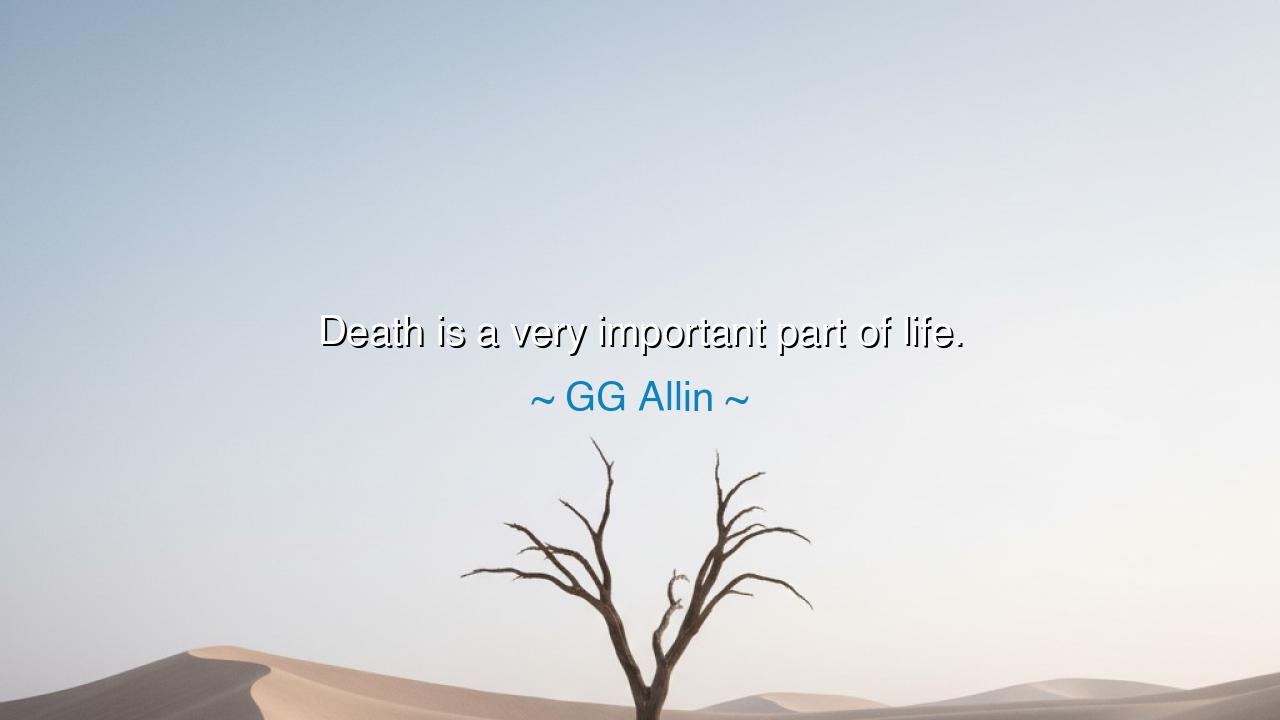
Death is a very important part of life.






In the stark and unsettling words of GG Allin, the outlaw prophet of punk, there burns a strange and timeless truth: “Death is a very important part of life.” Though his own existence was wild, violent, and self-destructive, this declaration reaches beyond rebellion and chaos. It touches the ancient wisdom that has haunted humanity since the dawn of consciousness—the recognition that life and death are not enemies, but eternal companions. In this single line, wrapped in the rough voice of a man who lived without restraint, lies a message older than any religion: to live fully, one must face death without fear.
To the ancients, death was never the end, but a transformation, a passage through the veil that separates form from spirit. The Egyptians built tombs that outlasted empires because they understood that remembrance was a second kind of life. The Greeks taught through their tragedies that mortality gives shape to meaning; without the shadow of death, the flame of existence burns without purpose. GG Allin, in his own brutal and misunderstood way, echoed this same truth. For him, death was not an interruption, but a completion—a mirror held to life, revealing its rawest form. He lived as though each day were a final act, and though his choices led to ruin, the fire behind his words reflects an eternal principle: to deny death is to deny life itself.
Throughout history, the wise have grappled with this paradox. Marcus Aurelius, the philosopher-emperor, wrote, “Do not act as though you were going to live ten thousand years. Death hangs over you. While you live, while it is in your power, be good.” He, too, understood that mortality sharpens virtue—that when we remember death, we begin to live rightly. The warrior who rides into battle, the artist who paints with urgency, the parent who treasures the fleeting laughter of a child—all are awakened by this same truth. Death’s presence gives life its weight.
There is a story told of Siddhartha Gautama, who became the Buddha. Sheltered from suffering in his youth, he once stepped beyond his palace walls and saw, for the first time, sickness, aging, and death. These sights shattered his illusions and became the foundation of his enlightenment. Without seeing death, he could not have understood compassion; without confronting impermanence, he could not have found peace. In this way, the Buddha and GG Allin—separated by centuries and worlds—both remind us that only when we stop running from death do we begin to understand what it means to live.
Yet the modern world hides from death. We veil it in euphemism, conceal it behind hospital curtains, and fear its whisper in every wrinkle and silence. But GG Allin—raw, feral, and unfiltered—tore that veil apart. He declared what few dare to say aloud: that death belongs to life as the night belongs to day. To live without acknowledging death is to live half a life, numb to its urgency and wonder. It is death’s certainty that gives love its depth, courage its meaning, and art its beauty. Without the end, the journey would lose its power.
The lesson, then, is not to seek death, but to befriend it—to hold it in the corner of the mind as a teacher, not an enemy. Let the knowledge of your mortality awaken gratitude for the breath in your lungs, for the sun upon your skin, for the fragile and fleeting chance to create something that endures. Remember that every word you speak, every act of kindness, every work of art is your defiance of oblivion. The wise do not run from death; they walk beside it, knowing that it grants value to every heartbeat.
So, children of the future, take heed: do not fear death, and do not waste life. Let the awareness of your end make your beginning brighter. Live with fire, but live with purpose. Create, love, forgive, and build—because the shadow that follows you is not your foe, but your measure. GG Allin, in his madness, uttered what sages have always known: death is not the opposite of life—it is its completion. And when you accept that truth, you will no longer live in fear, but in freedom, as one who understands that every moment, even the last, is sacred.






AAdministratorAdministrator
Welcome, honored guests. Please leave a comment, we will respond soon